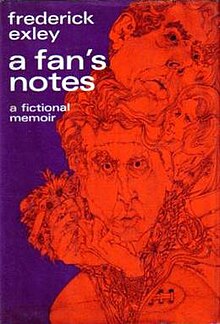A Fan's Notes is a 1968 novel by Frederick Exley.[1] Subtitled "A Fictional Memoir" and categorized as fiction, the book is semi-autobiographical. In a brief "Note to the Reader" in the opening pages, Exley writes: "Though the events in this book bear similarity to those of that long malaise, my life...I have drawn freely from the imagination and adhered only loosely to the pattern of my past life. To this extent, and for this reason, I ask to be judged a writer of fantasy."
 First edition | |
| Author | Frederick Exley |
|---|---|
| Language | English |
| Published | 1968 (Harper & Row) |
| Publication place | United States |
| Media type | Print (hardback & paperback) |
| Pages | 385 pp |
| Followed by | Pages From A Cold Island |
Since its publication the book has been reprinted several times and achieved a cult following.[2]
A Fan's Notes was briefly featured in the documentary film Stone Reader as an example of a brilliant debut novel.[3]
Synopsis
editA Fan's Notes is a sardonic account of mental illness, alcoholism, insulin shock therapy and electroconvulsive therapy, and the black hole of sports fandom. Its central preoccupation with a failure to measure up to the American dream has earned the novel comparisons to Fitzgerald's The Great Gatsby. It also was said to have, "hanging over the shoulder", Fitzgerald's later, confessional The Crack-Up, per a critic.[4] Beginning with his childhood in Watertown, New York, growing up under a sports-obsessed father and following his college years at the USC, where he first came to know his hero Frank Gifford, Exley recounts years of intermittent stints at psychiatric institutions, his failed marriage to a woman named Patience, successive unfulfilling jobs teaching English literature to high school students, and working for a Manhattan public relations firm under contract to a weapons company, and, by way of Gifford, his obsession with the New York Giants.
Exley's introspective "fictional memoir", a tragicomic indictment of 1950s American culture, examines in lucid prose themes of celebrity, masculinity, self-absorption, and addiction, morbidly charting his failures in life against the electrifying successes of his football hero and former classmate. The title comes from Exley's fear that he is doomed to be a spectator in life as well as in sports.
Film adaptation
editA Fan's Notes was made into a film in 1972 directed by Eric Till and starring Jerry Orbach as Exley.
Awards and honors
edit- 1968 William Faulkner Foundation Award for notable first novel
- 1969 National Book Award finalist
Legacy
editExley's biographer, Jonathan Yardley, of The Washington Post, called the book "one of the few monuments of postwar American fiction."[5]
References
edit- Exley, Frederick. "A Fan's Notes". 1968, New York. (ISBN 0679720766)
Notes
edit- ^ "Book Reviews, Sites, Romance, Fantasy, Fiction". Kirkus Reviews.
- ^ Shruers, Fred (August 10, 2015). "Frank Gifford and Frederick Exley: Beyond 'A Fan's Notes'". Grantland. Retrieved 24 October 2016.
- ^ Anthony, Andrew (2003-08-03). "On the trail of a lost genius". The Observer Review. London: The Guardian. Retrieved 2007-06-14.
- ^ Gopnik, Adam, "As Big as the Ritz", The New Yorker, September 22, 2014. Retrieved 2017-03-12.
- ^ Storr, Anthony (July 31, 1997). "THROUGH BLOODSHOT EYES" – via www.washingtonpost.com.
External links
edit- The New York Times Book Review, October 6, 1968
- Walter Kirn "Sad Sack Superman" Slate Magazine, August 20, 1997
- A Fan's Notes at IMDb